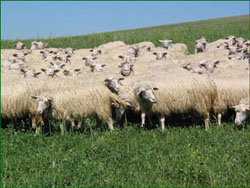Sheep feeding regimes give healthier milk
Protection against cancer and lowered cholesterol are among the acclaimed benefits of conjugated linoleic acids in the diet. Health supplements are an obvious source but it would be undeniably better to enrich the diet with natural sources of the fatty acids. Meat and milk products are rich in CLAs and the European funded project BIOCLA has researched into how to improve the content in dairy products through husbandry and diet. Italian based project partners at the Istituto Zootecnico e Caseario per la Sardegna (nowadays named Agris Sardegna, Dipartimento per la Ricerca nelle Produzioni Animali) focused their research on feeding regimes of sheep and their effect on the CLA content of the milk. The diet of sheep relies mainly on pasture grazing as rearing is largely outdoors. However, supplements can be provided when pasture is sparse and the team allowed for this in their tests. The trials were designed to measure the effects of two main factors. The first factor was the composition of pasture, especially with regard to presence of Mediterranean forage plants such as legumes like burr medic or sulla, and asteraceae like chicory or garland. The concentration of CLA precursors vary in relation to forage species and stage of growth and this can be determined by time of the season and grazing intensity. Secondly, the effects of supplementation were measured. Overall, the results of the trials showed that there is a direct relationship between the amount of green herbage and CLA content in the milk. Concentration of CLAs in the milk is higher in leafy growth so grazing at medium to high intensity in spring was recommended to defer flowering. At times of the year, when CLA content is low in the forage, the trials indicated that supplementation with fat-enriched additives could be effective. However, the scientists noted that sensory properties and shelf life of the resulting dairy products must be more deeply assessed in further trials. For sheep farmers the important message is that with good husbandry, the quality of sheep milk can be improved. Feed manufacture companies and the dairy industry overall all stand to benefit from the fact that sheep milk and cheese can be marketed as a truly functional food. Image caption: Sardinian dairy sheep grazing mixed swards







